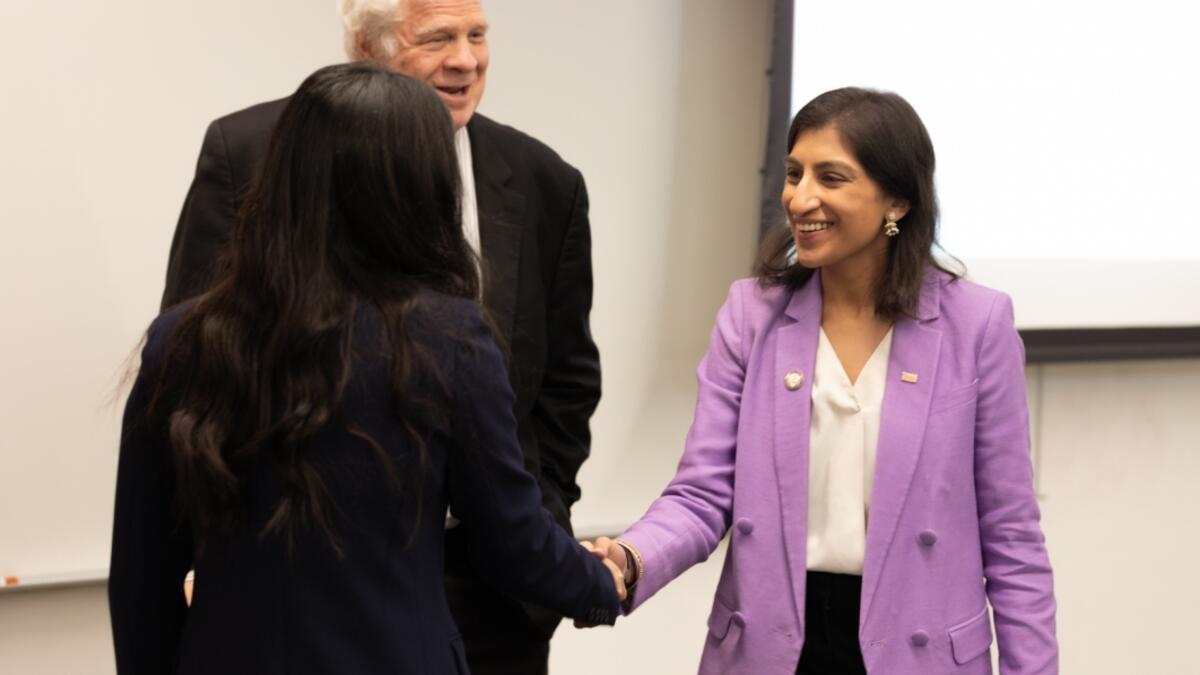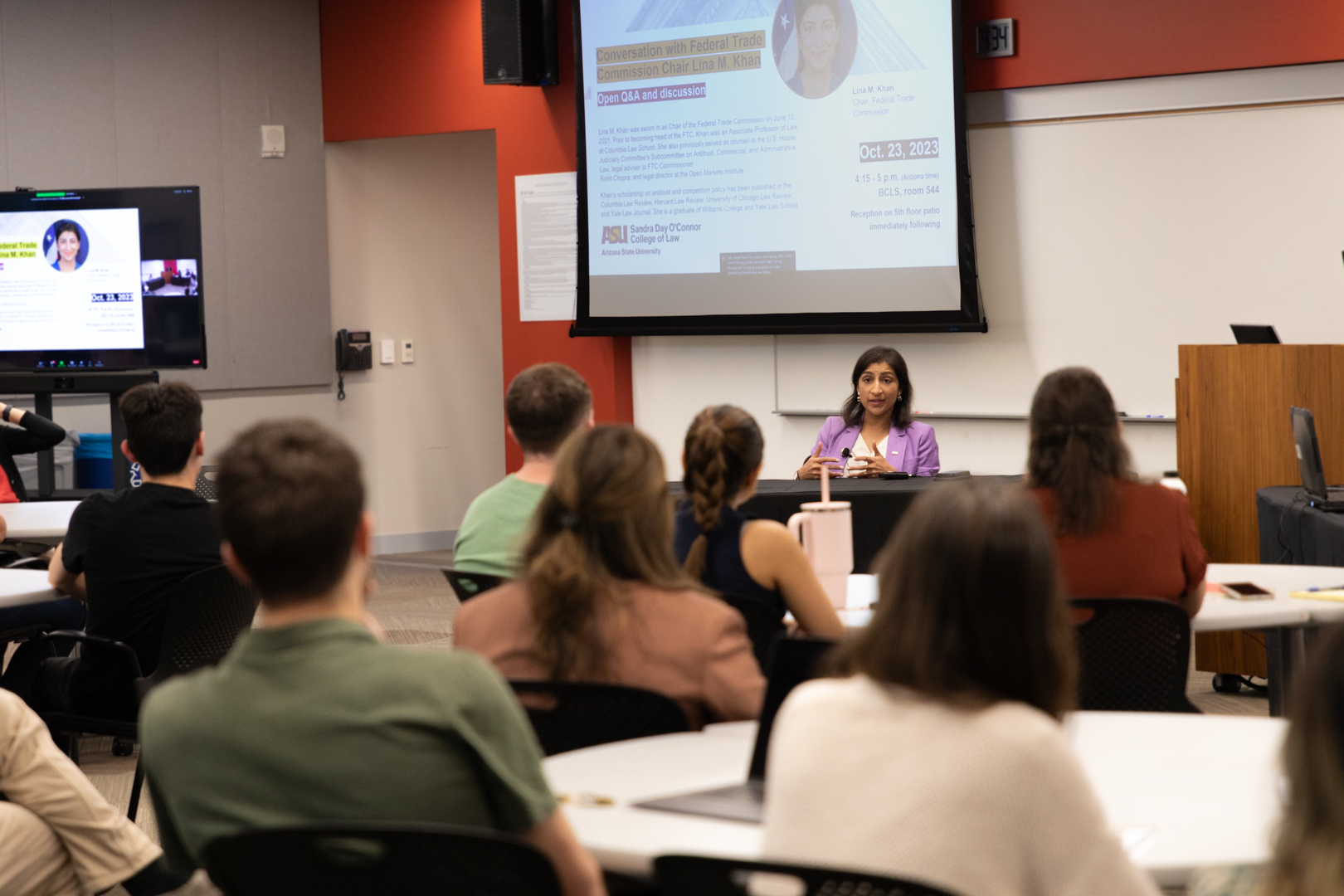Federal Trade Commission chair visits ASU Law for antitrust discussion

Federal Trade Commission Chair Lina Khan visited the Sandra Day O’Connor College of Law at Arizona State University on Oct. 23. Photo by Tabbs Mosier/ASU Law
Federal Trade Commission Chair Lina Khan visited the Sandra Day O’Connor College of Law at Arizona State University on Oct. 23 to engage with students and inspire the next generation of antitrust lawyers.
Khan was in Phoenix for a community listening session on the Albertsons and Kroger merger, which she co-hosted later in the evening with Arizona Attorney General Kris Mayes. She said she wanted to visit the city’s only law school while she was in the Valley. The FTC just launched its Honors Attorneys Program for recent graduates or early career lawyers who want to work on antitrust matters.
“It is an exciting and important time to work in the fields of antitrust and antimonopoly,” Khan said. “This work impacts sectors ranging from agriculture and food to health care, so it’s important that we attract a lot of talent. Antitrust can seem technical and arcane but is central to affording life-changing medications like insulin or the price of eggs.”
President Joe Biden nominated Khan to the commission in March 2021, and she began serving her seven-year term in June 2021 following her confirmation. She is also an associate professor of law at Columbia Law School, though she is currently on leave due to her role in the federal government. Khan graduated with her Juris Doctor from Yale Law School in 2017, making her the youngest person ever to head up the agency.
After law school, Khan went to work as legal director at the Open Markets Institute before joining the FTC in 2018 as a legal fellow in the office of Commissioner Rohit Chopra. In 2019, she began serving as counsel to the House Judiciary Committee's Subcommittee on Antitrust, Commercial, and Administrative Law, where she led the congressional investigation into digital markets.
Khan engaged with ASU Law students, faculty and community stakeholders in a Q&A session at the Beus Center for Law and Society in Phoenix, with others — including members of the FTC — participating via Zoom from the law school’s Washington, D.C., location.
ASU Law has a robust and growing Antitrust Law Program with roots in the Washington, D.C., location and courses in Phoenix, led by Sims Chair in Competition Law and Regulation and Professor of Practice Dave Gelfand. ASU Law recently established an antitrust fellowship program as well as the Technology Antitrust Regulation Project led by Gene Kimmelman, former senior advisor in the U.S. Department of Justice.
Gelfand encouraged students to listen to Khan and other viewpoints and form their own opinions about a field that impacts people’s day-to-day lives.
“I hope students get more inspiration to think about antitrust as a field and think about these issues in a new light,” he said.
Federal Trade Commission Chair Lina Khan engaged with students during a Q&A session at the Sandra Day O’Connor College of Law at Arizona State University on Oct. 23. Photo by Tabbs Mosier/ASU Law
During the Q&A, Khan spoke about her background in business journalism and how it led her to discover antitrust. She said she found a “quirky backdoor” way into antitrust as a business journalist and economic researcher while looking into agricultural markets and chicken farming. In speaking with farmers, she found they were often dependent on a single company, which often led to coercion and retaliation.
“Congress recognized that in the same way that we need checks and balances in our political sphere and in our government sphere to prevent outsized concentrations of political power, we also needed a set of laws to ensure and safeguard against a concentration of power in the economic sphere,” Khan said.
ASU Law students asked a number of wide-ranging questions, which allowed Khan to touch on topics like the NCAA’s antitrust exemption, how she measures her own success as the FTC chair, issues in digital advertising, the impact speech platforms can have on democracy, the FTC’s “unique value add” in enforcing laws and the 2023 draft merger guidelines released by the commission in July. She also discussed the differences between the FTC of the 1970s and the one today, namely the number of people and resources involved.
“We are returning the FTC to the vision that Congress had for it,” she said.
The talk was moderated by third-year law student Ashley Liu, who is taking antitrust law and mergers and acquisitions courses this semester.
“It was really special to get her firsthand perspective on important issues facing society today,” she said of Khan. “I feel like this affirmed that the school is committed to hearing different viewpoints in a positive space. She offers a fresh perspective, and it’s so valuable to students.”
Third-year law student Daniel Factor took an interest in antitrust law last year and wrote a law journal article on noncompete clauses, which the FTC scrutinizes. He said hearing from a big name like Khan was impactful to him as he prepares for life as an attorney in New York after graduation in May.
“This means a lot to me as a student,” he said. “I’m from New York, so I’m a bit of an outsider here (in Phoenix), and I was one student who pushed for more East Coast connections. An event like this is great for the school and makes it more competitive.”
More Law, journalism and politics

Annual John P. Frank Memorial Lecture enters its 26th year
Dahlia Lithwick, an MSNBC analyst and senior legal correspondent at Slate, is the featured speaker at the School of…

The politics behind picking a romantic partner
A new study reveals the role that politics play when picking out a romantic partner — particularly for older adults.“Findings…

Tips to make tax season less taxing
When it comes to highly unpleasant experiences, filing taxes is probably up there with root canals — which is why people put off…


